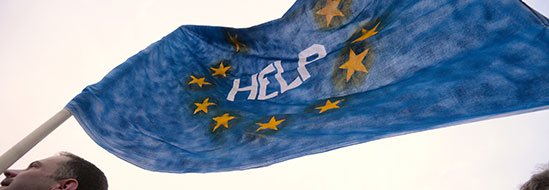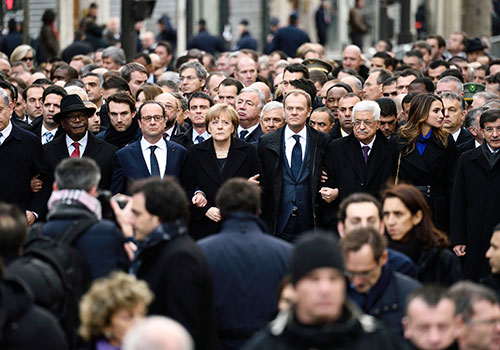In times of crisis, press freedom curtailed
The EU’s commitment to press freedom was tested by the attack on Charlie Hebdo in France. The initial show of solidarity, where heads of state marched through the streets of Paris, gave way to the acceleration of laws harmful to press freedom under the rationale of fighting terrorism.

Some of the most enthusiastic and vociferous proponents of greater Internet censorship and surveillance were France, Germany, and the U.K. In France, access to websites deemed by the Interior Ministry to condone terrorism was ordered blocked and sweeping authority was given to security services to monitor citizens. In Germany, Chancellor Angela Merkel sought to resurrect expansive powers that would allow the government to store telephonic and Internet metadata even of citizens not under suspicion, despite these powers already being rejected by the high courts of Germany and the EU. Such a measure would put every journalist, source, and reader under scrutiny. In the U.K,Prime Minister David Cameron demanded in public speeches and parliament that Internet companies allow authorities access to all encrypted communication, despite the position of leading computer security experts that introducing such vulnerabilities cannot be accomplished without endangering the systems on which all computers rely.
In addition to influencing the norms of more repressive countries, the actions of EU member states portend a troubling slide.

While the Charlie Hebdo attacks helped catalyze an illiberal trend plaguing many parts of Europe, they did not create it. Data retention was required of EU member states under a policy formed during the U.K.’s presidency of the Council, until the Court of Justice struck down the mandate in 2014. The court found that the mandate was a serious interference with privacy. For years, journalists in Europe have found themselves under surveillance, investigation, and harassment based on their work, according to news reports. Claims of concern over privacy in the EU and other countries have been abused to muzzle the press through court decisions and legislation, such as a law that came into force in 2014 in Hungary requiring photographers to gain the consent of anybody who appears in a picture, and Spain’s gag law, which carries a €30,000 fine for the unauthorized use of images depicting police.
The shift toward greater surveillance and censorship contradicts ideals on which the EU was founded. Website blocking such as that imposed in France abandons principles of free expression as fundamental as the prohibition on prior restraint of speech. Similarly, Internet filtering in the U.K. has resulted in the widespread censorship of newsworthy speech, according to research by online freedom organization Open Rights Group. Such blocking is especially dangerous because it is taking place in the absence of robust prior judicial review.
Cameron’s proposals that would undermine strong encryption—a push joined by officials in France, Spain, and other EU member states, has revealed deficiencies in its proponents’ understanding of technology, experts say. In addition, as United Nations special rapporteur on freedom of expression and opinion David Kaye warned in a report on encryption presented to the U.N. Human Rights Council in June 2015, undermining encryption likely violates international law. If successful, such efforts would put journalists and their sources at risk of discovery, exposure—or worse. For example, strong encryption protects computer networks as well as devices. Attempts to undermine it would enable authoritarian regimes that are willing to use such abilities against their own people or even across borders.
Journalism helps preserve democratic freedoms by ensuring public debate remains uninhibited, robust, and wide-open. If the richest, most liberal countries in the EU cannot live up to their own principles—as well as those protected under EU charters and international law—press freedom and journalist safety will increasingly be at risk not just inside Europe, but anywhere the EU has influence.